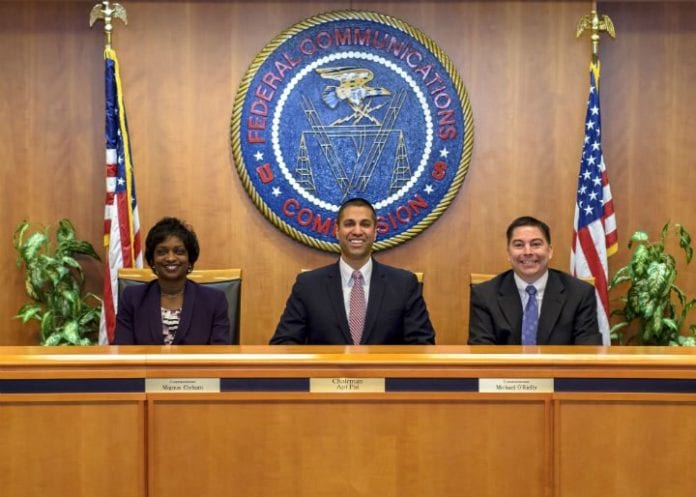The Federal Communications Commission voted along party lines to start the process of rescinding the “net neutrality” rules that treat broadband providers as telecommunications operators under the regulatory authority of the FCC.
FCC Chairman Ajit Pai and fellow Republican Commissioner Michael O’Rielly voted in favor of the proposed rulemaking process to repeal the regulations. Commissioner Mignon Clyburn, a Democrat, voted against it.
In her statement on the subject, Clyburn said that the move to repeal the regulations “deeply damages the ability of the FCC to be a champion of consumers and competition in the 21st century. It contains a hollow theory of trickle-down internet economics, suggesting that if we just remove enough regulations from your broadband provider, they will automatically improve your service, pass along discounts from those speculative savings, deploy more infrastructure with haste, and treat edge providers fairly.”
Pai called the proposal a return to “light-touch regulation” and blamed net neutrality regulations for recent reduced network investments among the nation’s top 12 largest internet service providers. He cited a study that said domestic broadband capital expenditures decreased 5.6% over the two years that the regulations were in effect. Clyburn disputed those figures, arguing that “the most recent analysis on the market actually suggests that total capital investment by publicly-traded ISPs, was up five percent since the 2015 Open Internet Order was adopted. Edge investments are up. Broadband revenues are up. This trend makes perfect sense, since no broadband provider, has ever told Wall Street, or the Securities and Exchange Commission, that the 2015 Open Internet Order, was responsible for decreases in capital expenditures.”
O’Rielly, who has called net neutrality a “harmful policy,” struck a more neutral tone on the topic in his statement, praising the intention to include a cost-benefit analysis of the rule. “One of the reasons why I welcome the opportunity to revisit these rules is that the prior Commission changed course so abruptly that it did not take the time to sufficiently examine the law and record and did not adequately respond to opposing viewpoints and alternative proposals,” O’Rielly said. “This time, I am confident that whether you agree or disagree on the need for net neutrality rules or our legal authority, you will see an order that fully and fairly responds to all substantive arguments.”
Also today, the FCC also launched a broad “review of its rules applicable to media entities, including broadcasters, cable operators, and satellite television providers,” asking for “public comment on which media rules should be modified or eliminated as unnecessary or burdensome.
“Through this review, the FCC seeks to reduce regulations that can stand in the way of competition, innovation, and investment in the media marketplace. The Commission also seeks input regarding specific rules from which small businesses should receive regulatory relief.
The commission also voted 2-1 (with Mignon dissenting) to freeze an upcoming rise in the rate floor for rural telephone service and review the rate floor framework or possibly eliminate it. The rate floor sets a minimum dollar figure — in this case, $18 a month that had been set to rise to $20 on July 1 — that rural telephone providers must recoup from their customers rather than through the Universal Service Fund. As O’Rielly noted, the rate floor was put in place so that rural telephone providers could not charge their customers artificially low rates and then ask the Universal Service Fund for full reimbursement for their costs. O’Rielly voted in favor of the freeze and Mignon also indicated that she was open to working on a solution; O’Rielly made it clear that he thought the program could be improved but that he did not support ending the rate floor policy.

